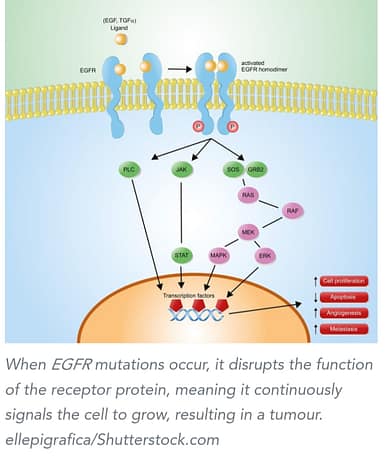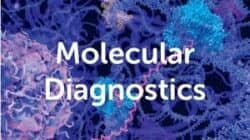In recent years, significant advancements in medical research have revolutionized cancer treatment, offering patients more tailored and effective therapies.
One such breakthrough is the EGFR mutation test, a vital component in the management of certain cancers, particularly non-small cell lung cancer (NSCLC)
An EGFR mutation test may be ordered by itself or as part of a panel to detect mutations in other genes such as KRAS,ALK ,ROS1,BRAFV600E. Each of these tests may be used to help determine whether a person’s lung cancer will respond to targeted therapy and which type will be of more benefit.
What is the EGFR Mutation Test?
The EGFR mutation test is a diagnostic examination that detects mutations in the Epidermal Growth Factor Receptor (EGFR) gene. This gene encodes the EGFR protein, which regulates cell growth and division. When mutations occur in the EGFR gene, it can lead to abnormal or overactive EGFR proteins.
These genetic alterations are commonly found in NSCLC and, in some cases, other cancers like colorectal, breast, and pancreatic cancers.
The test can be performed on a variety of tissue types, including lung tissue, lymph node tissue, and bone marrow tissue.
What are the benefits of EGFR mutation testing?
EGFR mutation testing can help to identify people with NSCLC who are likely to benefit from EGFR-targeted therapy. EGFR-targeted therapy has been shown to be effective in people with NSCLC who have EGFR mutations.
Sample Requirement for EGFR test
Tumor Tissue: Formalin fix (10 percent neutral buffered formalin) and paraffin embed tissue(FFPE )
Transport tissue block or 5 unstained 5-micron slides.
FNAC unstained slides
Blood for liquid biopsy which detect circulating cell-free DNA 10 mL Whole blood in 1 Streck tube .
How is the EGFR Mutation Test Performed?
The EGFR mutation test is generally conducted using a tissue sample obtained through a biopsy or surgical procedure. In some cases, a liquid biopsy may be used to analyze circulating tumor DNA. The sample is then sent to a specialized laboratory for analysis.
Techiniques for mutation analysis
Various techniques like PCR (Polymerase Chain Reaction) , qPCR, sanger sequencing and comprehensive next-generation sequencing (NGS) are employed to identify specific mutations in the EGFR gene.
Why is the EGFR Mutation Test Crucial?
The EGFR mutation test plays a pivotal role in cancer treatment for several reasons:
- Personalized Treatment: Identifying EGFR mutations helps oncologists customize treatment plans based on the patient’s unique genetic profile. This allows for targeted therapies that specifically address the cancer’s molecular characteristics, potentially enhancing treatment effectiveness.
- Predicting Treatment Response: EGFR mutations can influence how a tumor responds to certain medications. For example, patients with specific EGFR mutations in NSCLC may respond well to EGFR tyrosine kinase inhibitors (TKIs) like Erlotinib, gefitinib, or afatinib. Identifying these mutations can spare patients from ineffective treatments and their associated side effects.
- Monitoring Disease Progression: In cases where patients are already receiving targeted therapy, regular EGFR mutation tests can help monitor the tumor’s response and detect any acquired resistance mutations. This ensures that treatment strategies can be adjusted promptly if needed.
How long does it take for EGFR testing results?
EGFR mutation test might take few days to weeks depending upon the method of analysis.
What are the results of EGFR mutation testing?
The results of EGFR mutation testing can be either positive or negative. A positive result means that the person has a mutation in the EGFR gene. A negative result means that the person does not have a mutation in the EGFR gene.
What does it mean if I have a positive EGFR mutation test result?
If you have a positive EGFR mutation test result, it means that you are likely to benefit from EGFR-targeted therapy. EGFR-targeted therapy can help to control the growth of your cancer and improve your survival.
What does it mean if I have a negative EGFR mutation test result?
If you have a negative EGFR mutation test result, it means that you are not likely to benefit from EGFR-targeted therapy. However, there are other types of cancer treatment that may be effective for you.
what is EGFR mutation?
Epidermal growth factor receptor (EGFR) is a transmembrane protein with cytoplasmic kinase activity that transduces important growth factor signaling from the extracellular milieu to the cell .The EGFR gene is present on chromosome 7p11.2 .
It helps cells grow and divide by sending signals inside the cell. When EGFR binds to its ligand, epidermal growth factor (EGF), it activates a signaling pathway that leads to cell growth and proliferation .

In normal cells, the EGFR signaling pathway is tightly regulated. However, in cancer cells, mutations in the EGFR gene can lead to the production of an EGFR protein that is constantly activated, even in the absence of EGF. This excessive signaling can lead to uncontrolled cell growth and proliferation, which is a hallmark of cancer.
There are a number of different mutations that can activate the EGFR signaling pathway. Some of the most common mutations include:
- Exon 19 deletions: These mutations delete a portion of exon 19 of the EGFR gene, which encodes a portion of the EGFR protein. This results in a protein that is more active than the normal protein.This results in a protein that is more active than the normal protein. This mutation is found in about 45% of patients with NSCLC in Asian populations and 15% of patients in Western populations.
- EGFR exon 18 mutation: This mutation is a missense mutation that changes the amino acid glutamic acid to glutamine at position 719. This mutation is found in about 3-5% of patients with non-small cell lung cancer (NSCLC).
- EGFR exon 20 mutation: This mutation can be a missense mutation, a deletion, or an insertion. The most common missense mutation is the threonine to methionine (T790M) mutation. This mutation is found in about 5-10% of patients with NSCLC.
- EGFR exon 21 mutation: This mutation is a missense mutation that changes the amino acid leucine to glutamine at position 858. This mutation is found in about 10% of patients with NSCLC.
- Point mutations: These mutations change a single amino acid in the EGFR protein. Some point mutations, such as the L858R mutation, make the protein more active.
- Amplification: This is when the EGFR gene is duplicated many times. This can lead to the production of too much EGFR protein, which can activate the signaling pathway excessively.
How targeted therapy work?
Targeted therapy drugs are EGFR tyrosine kinase inhibitor. It works by binding to the intracellular enzyme (tyrosine kinase) of the EGFR to directly block signals turned on by triggers outside or inside the cell.
What are secondary EGFR mutation?
Secondary EGFR mutations are mutations that occur in the EGFR gene after a patient has been treated with EGFR-tyrosine kinase inhibitors (TKIs). These mutations can lead to resistance to TKIs, and can make the cancer more difficult to treat.
The most common secondary EGFR mutation is T790M, which occurs in about 50% of patients who develop resistance to first-generation TKIs like Gefitinib. Other secondary EGFR mutations include C797S, L718Q, and G724A.
The exact mechanism by which secondary EGFR mutations lead to resistance to TKIs is not fully understood. However, it is thought that these mutations can change the structure of the EGFR protein, making it less susceptible to inhibition by TKIs.
There are a number of different treatment options available for patients with secondary EGFR mutations. Some of these options include:
- Switching to a different TKI that is active against the secondary mutation.
- Combining a TKI with other drugs, such as chemotherapy or immunotherapy.
- Participation in clinical trials of new drugs or treatment strategies.
The choice of treatment will depend on the specific secondary EGFR mutation, the patient’s overall health, and other factors.
What other types of cancers have EGFR protein mutation?
colorectal cancer,Head and Neck Squamous Cell Carcinoma (HNSCC),Glioblastoma small proportion of ovarian cancer cases. Research is ongoing to understand the significance of these mutations for treatment selection.
SOURCES:
https://www.aacc.org/cln/articles/2013/october/egfr-mutations


2 thoughts on “Understanding the EGFR Mutation analysis Test”